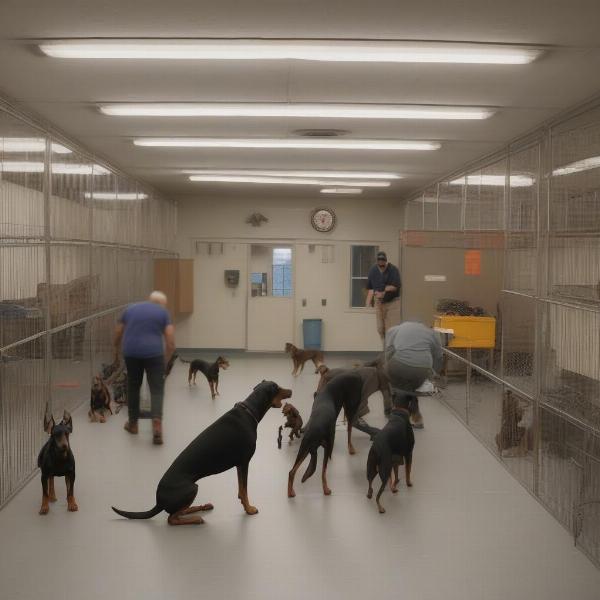Doberman rescue dogs offer a wonderful opportunity to welcome a loving and intelligent companion into your life. Adopting a Doberman can be a rewarding experience, but it’s essential to understand the breed’s specific needs and be prepared to provide a supportive environment. This guide will provide valuable insights into finding and caring for a rescued Doberman.
Understanding the Needs of Doberman Rescue Dogs
Dobermans are known for their intelligence, loyalty, and athleticism. They thrive on human interaction and require consistent training and socialization from an early age. Rescued Dobermans may have unknown pasts, and some might come with emotional baggage or behavioral challenges. Patience, understanding, and a commitment to positive reinforcement training are crucial for successful integration into your home.
Understanding their potential past is key to helping them adjust to a new life. Some rescues may have experienced neglect or abuse, leading to anxiety or fear. Others might have been surrendered due to changes in their previous owner’s circumstances. By being aware of these possibilities, you can approach your new companion with empathy and create a safe and nurturing environment.
Finding a Reputable Doberman Rescue Organization
Finding the right rescue organization is crucial for a successful adoption process. Research different organizations and look for those with a strong track record of responsible rehoming practices. Reputable rescues will thoroughly screen potential adopters, conduct home checks, and provide comprehensive information about each dog’s history, temperament, and health. They’ll also be a valuable resource for ongoing support and advice.  Volunteers interacting with Dobermans at a rescue organization
Volunteers interacting with Dobermans at a rescue organization
Preparing Your Home for a Rescued Doberman
Before bringing your new Doberman home, ensure your environment is safe and suitable. A securely fenced yard is essential for exercise and playtime. Dobermans are intelligent and can be escape artists, so a sturdy fence is a must. Inside your home, remove any potential hazards, like toxic cleaning products or loose electrical cords. Provide a comfortable bed, food and water bowls, and a variety of toys to keep your Doberman entertained and engaged.
The First Few Weeks: Patience and Understanding
The initial adjustment period can be challenging for both you and your rescued Doberman. Be patient and understanding as your new companion acclimates to its surroundings and learns to trust you. Establish a consistent routine for feeding, exercise, and potty breaks. Introduce your Doberman to new people and environments gradually, using positive reinforcement to build confidence.
Training and Socialization for a Rescued Doberman
Training and socialization are essential for all Dobermans, especially rescues. Enroll in obedience classes to reinforce basic commands and build a strong bond with your dog. Socialization helps your Doberman learn to interact appropriately with other dogs and people, reducing the risk of behavioral issues. Consistent, positive reinforcement training methods are key to success.
Long-Term Care for Your Doberman Rescue
Providing proper nutrition, regular exercise, and routine veterinary care are crucial for your Doberman’s long-term health and well-being. Feed a high-quality dog food formulated for large breeds and ensure your dog gets plenty of exercise through walks, runs, or playtime in a secured area. Regular veterinary checkups will help identify and address any potential health concerns promptly.
Conclusion: The Rewards of Rescuing a Doberman
Adopting a Doberman rescue dog can be a truly rewarding experience. By understanding their specific needs, providing a loving and supportive home, and committing to consistent training and socialization, you’ll gain a loyal and devoted companion who will enrich your life for years to come.
FAQ
- Are Doberman rescue dogs aggressive? Not inherently. Any aggression is usually a result of past experiences or lack of socialization.
- How much exercise does a rescued Doberman need? At least an hour of vigorous exercise daily.
- Are Dobermans good with children? With proper socialization, they can be excellent family dogs.
- What should I feed my Doberman rescue dog? A high-quality dog food formulated for large breeds.
- Do Dobermans require special grooming? Their short coat is relatively low-maintenance.
- Are Dobermans prone to any health problems? Yes, some breeds are prone to certain health conditions. It is important to be aware of these and discuss them with your vet.
- How do I find a reputable Doberman rescue organization? Research online and contact local animal shelters.
Related Articles:
About ILM Dog:
ILM Dog is a leading international online resource dedicated to providing expert advice on dog care, breeds, health, training, nutrition, grooming, and much more. We offer valuable insights for both novice and experienced dog owners, helping them navigate all aspects of responsible dog ownership. From choosing the right breed to understanding specific health needs, ILM Dog is your trusted companion on your dog ownership journey. Contact us at [email protected] or +44 20-3965-8624 for expert advice.